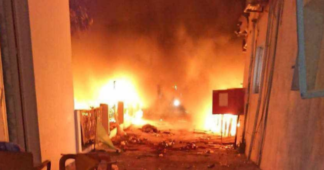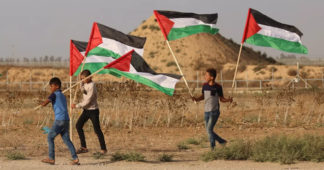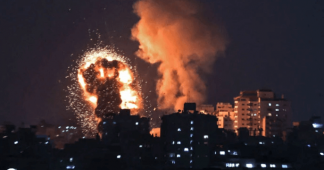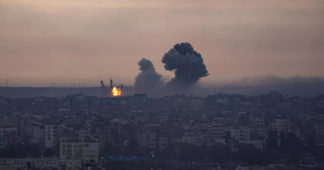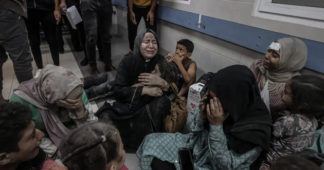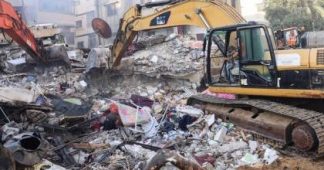Until urgent interventions are made thousands of Palestinians face a slow and painful death in the absence of basic medical care and repeated attacks on health workers by Israeli occupation
October 18, 2023
The bombing and killing of at least 500 people at Al-Ahli Arab Hospital by the Israeli occupation forces in central Gaza late on October 17 was seen by many as no accident. Much like the bombed hospital, often described as “a safe haven of peace and compassion in the midst of chaos,” Palestinian health workers and infrastructure have been a favorite target of Israel’s aggression long before the latest round of attacks.
In the past twelve days of the latest round of Israeli war on Gaza not only have health activists and ambulances been stopped at checkpoints and faced violence from the occupying forces, but more than 12 Palestinian health workers have been killed in the indiscriminate Israeli bombings so far.
Additionally, as per reports by the WHO, 48 health institutions in Gaza and 111 in the overall occupied Palestinian territories have been attacked, in one way or another, ever since the current round of bombings began on October 7. The WHO also recorded at least 113 counts of attacks on healthcare in the first 10 days of Israeli bombings in Gaza alone.
Considering that Gaza had no health workers or other resources to spare – with less than 13,000 registered active health workers for almost 2 million people in 2022 – the losses incurred over the past days are distinctive.
The Israeli occupation knows those facts. More than 17 years of its blockade and numerous rounds of targeted bombings of civilian infrastructure have contributed to the gradual decline of Gaza’s health infrastructure, much like all other aspects of life.
Still it chose to impose a fresh blockade on the supply of all kinds of basic goods including fuel and food three days after the Operation Al-Aqsa Flood was launched by the Palestinian resistance groups.
Israel’s repeated warnings asking medical facilities in northern Gaza to be vacated in less than 24 hours last week caused additional stress on the medical staff and infrastructure, with thousands under the threat of being bombed.
The demands were refused by many hospitals, whose workers warned that it would be impossible to transfer patients from intensive care units and other departments even if they have been given days, not hours. Even if they could have been moved, there was no safe place for them to go to.
Israel ignored the repeated appeals and warnings issued by the WHO and other international agencies both about the implications of the bombings and the blockade and forced evacuation.
Mustafa Barghouti, a Palestinian physician and health activist, warned during a recent discussion facilitated by the People’s Health Movement (PHM) that the lack of food, clean water, and sanitation, with overcrowding, will certainly lead to an increased risk of outbreaks of communicable diseases.
With health workers unable to reach people because of the rubble and destruction of all vital , or worse, because they are dead, it is difficult to imagine how the response to outbreaks is supposed to be organized.
A statement issued by Palestinian Medical Relief Society states, the lack of medical supplies and fuel have left people to die slowly. “It has now reached a point that being bombed versus a slow death would be a blessing.”
Among those 48 health institutions attacked in Gaza were also health centers and hospitals operated by AWDA, a Palestinian organization that provides health care to 600,000 people each year.
Two of AWDA’s workers were killed during the attacks prior to October 17, yet their colleagues refused to leave patients behind even in the face of Israel’s orders to evacuate the hospitals that reached them on Saturday, October 14. More than 400 people work with AWDA throughout Gaza, including in the Jabalia refugee camp.
Al-Awda Hospital in Jabalia provides maternity services – a particularly important service considering that normally there are 184 deliveries a day in the besieged Gaza strip. Child and maternal mortality remain among the top health concerns as Israel continues to bomb tens of thousands of people in the area.
In addition to the almost 1,000 Palestinian children who were killed in the past 11 days – not even counting those in Al-Ahli Hospital or the UNRWA school hit earlier in the day – thousands more are facing a severe mental health crisis that is likely to last for years.
In many of its centers, AWDA has been providing care to children, women, and youth in the months preceding the latest series of attacks. This included not only health care but also programs that aim to build community capacities to protect the right to health in the face of Israeli colonialism.
While the programs have helped hundreds of people to administer first aid and react during attacks on Gaza, AWDA’s infrastructure has been seriously damaged, just like that of other hospitals and health centers, over the past week. The health and community center in Beit Lahia in northern Gaza was closed because of the damage caused by nearby bombing earlier on Tuesday.
Meanwhile other centers continue to function under the constant threat of running out of fuel for generators, blood, and medical supplies.
Tlaleng Mofokeng, UN Special Rapporteur on the right to health, described the situation as health workers “working in a dire situation with limited access to medical supplies and conditions that do not allow them to provide timely and quality healthcare.”
In simpler terms, it means that Israel is doing everything to destroy the health system in Gaza.
The WHO has already sent enough supplies to treat at least 300,000 people near the border between Egypt and Palestine, which, like all other supplies needed for people in Gaza to survive, are being held back by Israeli bombs. No significant attempt to change this is to be seen at the level of the so-called international community.
On the other hand, as physician and health activist Layth Hanbali, reminded participants in PHM’s online meeting, the time has passed for people in Palestine to put much faith in international law, let alone humanitarian corridors.
“It will not be international law and the international community to deliver justice. Justice will be delivered by the people,” said Hanbali.
We remind our readers that publication of articles on our site does not mean that we agree with what is written. Our policy is to publish anything which we consider of interest, so as to assist our readers in forming their opinions. Sometimes we even publish articles with which we totally disagree, since we believe it is important for our readers to be informed on as wide a spectrum of views as possible.
